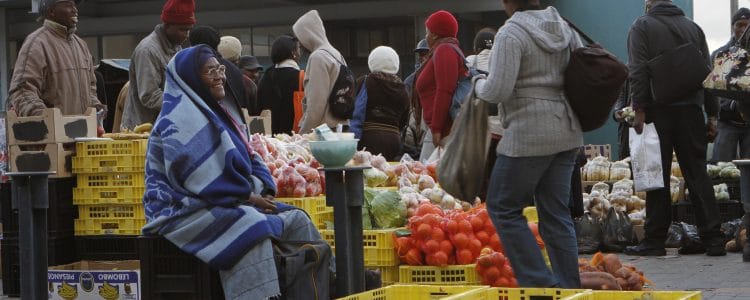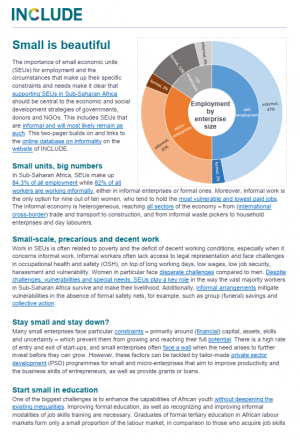
An enabled, well-supported and dynamic informal sector can be a potent instrument for generating more inclusive growth. Our latest research highlights the important role of informal enterprises in providing paid employment and reducing poverty in South Africa. Enlarging this role substantially and sustainably will require effective enabling policies, including ‘smart’ formalization. Otherwise, the sector will simply remain forgotten – and so will the people working in it.
Growing informal sector employment is relevant because the unemployment rate in South Africa is extremely high at approximately 25% (or 37% if you include discouraged workers). Despite this, the sector has remained forgotten or on the margins of economic analysis and policy consciousness for many decades. A major reason for this is that many researchers and commentators view informal sector participants as being without aspirations or entrepreneurial skills – as ‘merely survivalist’, with no meaningful role to play in generating employment or reducing poverty. This is often related to a narrow view of the sector as comprising mostly street traders and waste pickers. Consequently, policymakers overlook the potential of informal enterprises, the constraints they face, their particular vulnerability and the policy support that could make them more viable and self-standing. For example, in the National Development Plan, the analysis and policy proposals for small business and employment do not mention the informal sector, even though the Plan projects the sector to deliver almost 2 million additional jobs by 2030.
Our research shows unambiguously that the informal sector is an important source of employment – and of paidemployment – with a growing propensity to employ. Despite high unemployment, South Africa’s informal sector is small compared to many other developing countries. Nevertheless, at about 17% of total employment, one in every six workers is employed in the informal sector. Informal enterprises provide livelihoods, work and income for more than 2.5 million workers and owner-operators.
Approximately 80% of the 1.4 million informal enterprises are own-account workers, i.e. one-person enterprises, and 20% are multi-person enterprises (employing enterprises) (2013 data). This suggests a sector dominated by own-account workers. However, a striking finding is that almost half (48%) of those working in the informal sector work in multi-person enterprises. These enterprises provide about 850,000 paid jobs to owner-operators and employees. This is almost twice the direct employment provided by the formal mining sector, a major component of the formal economy in South Africa.
The informal sector is diverse and comprises all industries, not just trade. Most of the multi-person, employing enterprises are in construction, retail trade and services, but also in manufacturing and communication. The informal construction industry has a high propensity to employ. Furthermore, the informal sector is not static either. More than half a million new jobs were created in a one-year period (2013 data). About 150,000 jobs came from employment expansion in both one-person and multi-person enterprises. In the same period about 60,000 jobs were lost due to employment cutbacks. In addition, roughly 380,000 new jobs were created due to about 300,000 businesses starting up in 2013, making the annual entry of new enterprises quite high. However, about 40% of start-ups close down within six months, due to early-stage vulnerability.
What is remarkable about the informal sector, is the poverty-reducing effect of employment. The loss of 100 informal-sector jobs has about the same poverty-increasing impact as losing 60 to 80 formal-sector jobs. Thus policy-makers should not be cavalier about losing or destroying informal-sector jobs.
Inclusive growth cannot be attained only by sharing the ‘fruits of growth’ with poor people (through, for example, social grants and housing, education and health services). A proper inclusive growth strategy needs to get the poor to actively participate, via employment, in growing economic processes, producing output and earning a decent income.
Identifiable obstacles and constraints lead to the failure of informal enterprises and loss of jobs. These include a lack of suitable and secure premises in good locations, limited or no bookkeeping skills, a lack of finance, credit and insurance, and being the target of crime – as well as harassment by local government. Several constraints are structural and intrinsic to the concentrated nature of the economy. These hinder informal enterprise owners in reaching beyond local markets, graduating to upper tiers of the sector, or stepping up to higher-value markets and formal sector value chains.
So, what is the way forward for South African policymakers? The informal sector needs to be supported by a development-oriented policy approach in which enterprises are enabled to become self-standing institutions that are organisationally and financially separate from the household. A good place to start is by teaching enterprise owner-operators basic bookkeeping skills and providing them with suitable premises for their businesses – these are factors associated with employment growth. Such policies – instead of enforced formalization, which is often limited to tax registration and business licensing – could make a significant difference to the job opportunities, earnings and working conditions of the poor. ‘Smart formalization’ should be development oriented and offer a menu of elements of formality, which enterprises can access as required, in a step-wise fashion, as they become more mature and eventually part of the formal sector.



I would like to do a research project
It’s nice to use your pageI